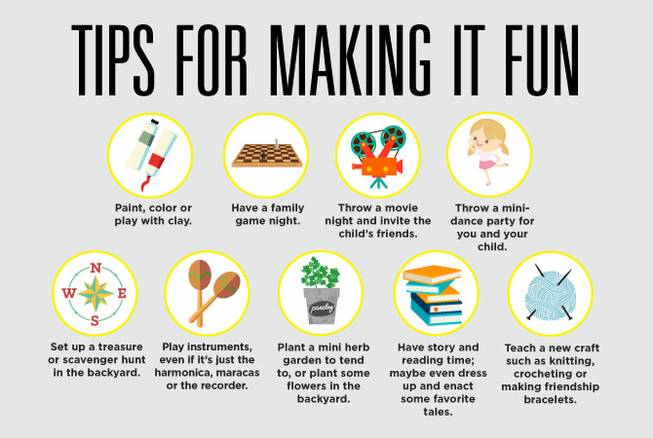
Monday, Aug. 1, 2016 | 2 a.m.
Sprains, breaks, bruises and cuts are all part of being a kid, and most children will suffer an injury at some point. While the severity and type of injury will vary, most parents will have to care for an injured and healing child at home. “There are multiple components to the healing process. It’s physical, mental and emotional, and each needs to be accounted for,” said Carmen Leung, MS, Child Life Specialist at Sunrise Children’s Hospital.
Being prepared and knowing how to care for an injured child can make for a calmer, more relaxed healing process.
Emotional soothing
After an injury, your child may feel anxious and shaken up. The extent of the emotional impact will depend on his or her personality, the circumstances surrounding the injury, the severity of the injury and/or the ongoing care following the injury. While there is no way to entirely mitigate this stress, there are ways to help your child process and cope with it.
“The best thing you can do is communicate openly with your child; ask them how they’re feeling, what they need and what would make them feel better,” Leung said. She also recommended that parents focus on finding solutions while always being sure to validate the child’s feelings. “Don’t dismiss their pain or tell them not to cry. Explain that crying is OK while still working toward a solution. It can be as simple as saying, ‘Yes, I know this hurts, but what can I do to make it better?’” Leung said.
For children whose injuries were traumatic and/or non-accidental, extended counseling might also be necessary. Talk to your pediatrician if this is the case, or if your child continues to show signs of emotional stress for a prolonged period, regardless of the severity of the injury.
Leung said that if the child continues to act out or regress behaviorally, he or she may still be experiencing pain or emotional trauma.
Re-establishing routine
While many children delight in the idea of lying on the couch all day watching TV, this gets old quickly and restlessness sets in within a couple of days. One of the most important things parents can do for their recovering child is maintain and encourage his or her regular routine.
“Returning to their routine helps establish the child’s sense of normalcy following an injury,” Leung said.
Reintegrate the child into a routine as much as is reasonable and make adaptations if need be. For example, if the child’s normal chore is to do the dishes but he or she has a broken arm, change the chore to taking out the garbage. Collaborate with the child when finding new chores and activities post-injury.
Tips for making it fun
Beyond chores and normal routines, you should try to help keep your child busy and distracted with fun activities. “Any injury that requires prolonged healing is difficult, and it’s especially tough for athletic children,” Leung said. Finding new activities to replace physical ones can help pass the time and ease the healing process.
Leung recommends adapting activities to the child’s interests as much as possible. For example, if the child normally plays basketball, setting up a beanbag-toss game might be a good substitute.
Other fun activities include:
• Paint, color or play with clay.
• Have a family game night.
• Throw a movie night and invite the child’s friends.
• Throw a mini-dance party for you and your child.
• Set up a treasure or scavenger hunt in the backyard.
• Play instruments, even if it’s just the harmonica, maracas or the recorder.
• Plant a mini herb garden to tend to, or plant some flowers in the backyard.
• Have story and reading time; maybe even dress up and enact some favorite tales.
• Teach a new craft such as knitting, crocheting or making friendship bracelets.
Caring for yourself after your child is injured
Many parents experience a sense of helplessness, frustration and even guilt following their child’s injury. Parents experiencing such feelings should be sure to dedicate time to heal and care for themselves, as well.
“I try to remind parents that kids are kids and while we do everything we can to prevent it, they’re going to get into trouble sometimes. Parents can’t always be there to protect them and accidents happen, so focus on moving forward and being there for the child now instead of dwelling on the past,” Leung said. Staying positive and modeling patient, kind behavior, even when you’re stressed out, will help keep your child at ease.
It may also be beneficial to view your child’s injury as an opportunity to bond with him or her and spend extra time together that you may not have had otherwise. Children pick up on anxious energy, so if your attitude is positive and upbeat, your child will likely adopt a similar outlook.

Join the Discussion:
Check this out for a full explanation of our conversion to the LiveFyre commenting system and instructions on how to sign up for an account.
Full comments policy